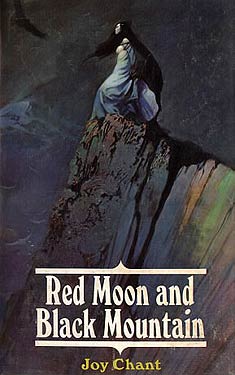Joy Chant
Completed 12/29/2021, Reviewed 12/29/2021
4 stars
This is a tough one to review. I started out not liking it but loved the ending. The story felt derivative, although this book was first published in 1970 by the same publisher of JRR Tolkien. It kind of had the feel of a cross between Narnia and Lord of the Rings and an old pulp fantasy novel, which is probably why Allen & Unwin published it. It’s written well and the world building is very good. I thought the end was tremendous. It just didn’t sit right with me for the first half of it. This book won the second Mythopoeic Award in 1972, the year after it was published here in the States.
The story is about three children, Oliver, Nicholas, and Penny, who stumble out of the present and into an alternate universe. Nicholas and Penny find themselves together near a great black mountain pelted by snow. The are found by a princess and her entourage. Oliver finds himself out on a plain and is discovered by a nomadic tribe. Oliver integrates into the tribe, forgetting his past. Nicholas and Penny find themselves on an adventure at the beginning of a battle between good and evil. Eventually, all the peoples of this world come together to fight the great evil that has arisen and wants to destroy everything good in the world.
So you can see why it bears resemblance to Lewis and Tolkien. I think that’s why I had a hard time with it in the beginning. It also didn’t help that the names of this alternate universe’s inhabitants were very difficult to get used to, often containing apostrophes and or unusual consonant pairings. There were a lot of characters for a short book. There were mostly men and a lot of them ran together, as did the place and tribal names. Lots of M’s, H’s and K’s. The few women that were present were pretty strong, for the most part, although I was bummed that the powerful enchantress princess fell silly in love with a man. It didn’t fit the character she was at the beginning.
In general, I thought the characters and the dialogue were wooden. There didn’t seem to be much emotional depth to them. The princess wasn’t too bad and Nicholas and Penny had some depth as well. Oliver was one-note, the brooding teenager who is called to greatness, and still broods. But somehow, by the end, I was pretty attached to the children and the major players from the alt-uni.
The ending, though, packed a punch. There was a very well-written battle, and Oliver’s brooding actually felt authentic throughout it and afterwards. I found myself slowing down my reading to make sure I got every word and nuance of what was happening. This was a stark contrast particularly to the middle third of the book where I just wanted to get through it as quickly as I could. The effort paid off and I was rewarded with a thorough enjoyment of the conclusion.
I toyed with giving this book three stars because of the derivative nature and the fact that I wasn’t happy with the first half. But I loved the second half so much that I decided to give it a reluctant four stars out of five. This book is the first of a trilogy, though it appears they are not dependent on each other. The third, “When Voiha Wakes”, also won the Mythopoeic Award, so I’ll be reading that as well. The second book was a prequel to the first, so I’m hoping I won’t be lost when I read Voiha. Now that I’ve finished this book, I’m actually looking forward to it.

No comments:
Post a Comment